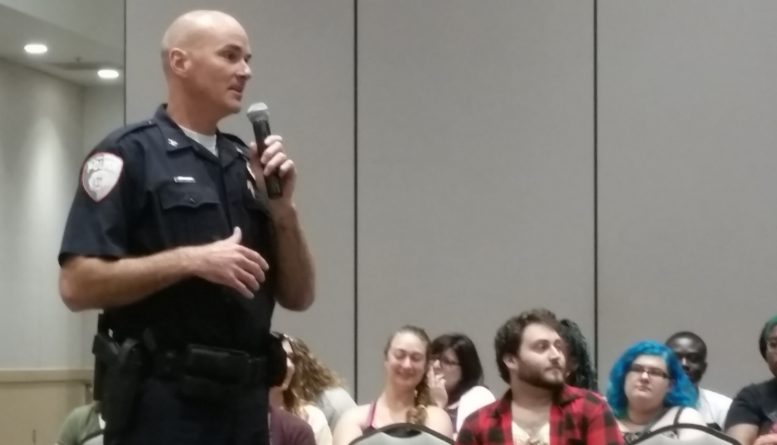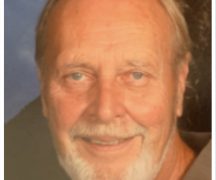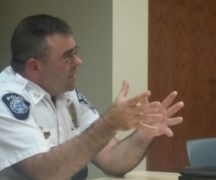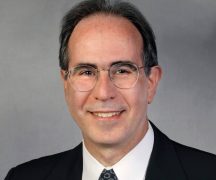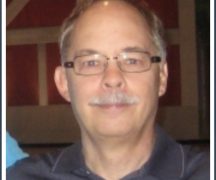By JAN LARSON McLAUGHLIN
BG Independent News
Bowling Green State University students and staff met Tuesday to prevent their campus from becoming another Charlottesville.
Many of those present had fresh memories of the white supremacy leaflets posted around campus this past spring. And they had even fresher memories of the images of the violence at a white supremacists rally in Charlottesville earlier this month.
Tuesday’s scene at BGSU was set as Angelica Euseary and Zarina Cornelius, of the Black Student Union, played video of President Donald Trump’s three statements about Charlottesville. They reminded the audience of the Maumee man who drove his car into a crowd, killing one and injuring many more.
Euseary said Tuesday’s “community conference” was a safe space, where no bashing was allowed. “Attack the argument, not the person,” she said.
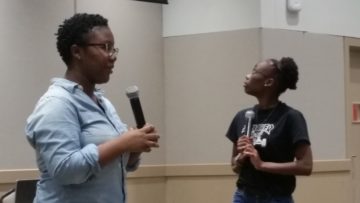
Angelica Euseary and Zarina Cornelius, of the Black Student Union, talk about Charlottesville.
Those present were reminded that last spring BGSU was targeted by alt right white supremacists, who stuck materials around campus. Those items were quickly removed, but left a bad feeling among many on campus.
Students wanted to know how BGSU police would handle a demonstration like the recent one in Charlottesville – if neo Nazis and other white supremacists came here to rally.
BGSU Police Chief Mike Campbell said the campus department’s 24 sworn officers have trained for handling demonstrations – both passive protesters and active aggressors.
But he admitted his office has limitations. “We’re a small agency,” he said. BGSU police department has mutual aid agreements with Bowling Green, Wood County and state law enforcement – who would be called in to assist.
Campbell stressed that students could also help by sharing information with police.
“You guys are going to understand things are brewing long before I do,” he said. He asked that students talk with police so they can prepare for demonstrations. “We’re going to take it seriously if we get word of something.”
“We want to intervene early if we can,” Campbell said.
Some students asked about freedom of speech – if there are lines that can’t legally be crossed.
“That can be a difficult topic,” Campbell said. “We’re talking about a Constitutional right that applies to everyone,” even if some find the words offensive. “There’s a limit to what we can restrict.”
Freedom of speech law can be tricky, he said. And there is no firm line defining when freedom of speech turns to hate speech.
“Does that mean we can blanketly say what we want? No,” Campbell said.
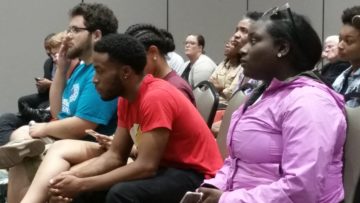
BGSU students listen during “community conference.”
The chief also said that while BGSU has designated “freedom of speech” areas on campus, groups are allowed to hold rallies elsewhere on campus as long as they aren’t disrupting classes or the flow of student traffic.
Campbell asked that students look at the police as partners on campus.
“Our sole purpose is the safety and security of the university,” he said. “We want to make sure this is a safe environment.”
“The last thing I want you to do is look at us as just the cops on campus,” the chief said.
One student asked about police training for working with marginalized people – blacks, transgender, mentally ill. She asked about sensitivity training for the department.
Campbell listed off the required training for all the officers. But the student said that training was all institutionalized, and asked if there might be a way for the community to offer additional training. “So we can teach you what you need to know.”
Also speaking at Tuesday’s community gathering was Jodi Webb, associate vice president of student affairs at BGSU. She reinforced the university’s “See it, hear it, report it” program, and encouraged students to notify BGSU of hate speech or discriminatory acts.

